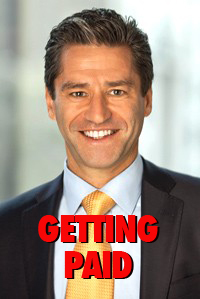Time Warner Cable CEO Has 80 Million Reasons To Root For Comcast Merger
 Imagine you’re two months into your dream job, the one you’ve been groomed to get for years. You’ve finally gotten the chance to right a ship that has been veering off course for too long and prove that you’re a real titan of industry. You’d probably hate to then find out that you’ll be out of this job within a year or so… that is until you’re told that you’ll get a $79.9 million payoff to soothe your pain.
Imagine you’re two months into your dream job, the one you’ve been groomed to get for years. You’ve finally gotten the chance to right a ship that has been veering off course for too long and prove that you’re a real titan of industry. You’d probably hate to then find out that you’ll be out of this job within a year or so… that is until you’re told that you’ll get a $79.9 million payoff to soothe your pain.
In a Securities and Exchange Commission filing made by Comcast earlier today, the cable/Internet giant lays out not only the timeline of the events leading up to the deal to acquire Time Warner Cable, but also just how much top executives like TWC CEO Rob Marcus, who only took over the top position at the start of the year, will be compensated.
It’s a huge filing and the compensation package for Marcus involves various sources — restricted stock, unvested stock options, cash, among others — but according to Bloomberg’s math, Marcus will receive a total payout worth $79.9 million, including $20.5 million in cash, for his brief time at the TWC helm.
That number could inflate by another $2.5 million if TWC meets certain minimal goals leading up to the merger, meaning Marcus may occasionally need to show up to work before cashing that huge golden parachute paycheck.
Marcus had been the Chief Operating Officer at TWC since 2010 and stepped up to replace former CEO Glenn Britt when he left the top post at the end of 2013.
Other TWC execs who have a very good reason to push for the Comcast/TWC merger are Artie Minson, who would take home $27.1 million for being the Chief Financial Officer of a crappy cable company that has survived by being the dominant pay-TV and broadband provider in the nation’s two largest cities; TWC’s Chief Technology and Network Operations Officer Michael LaJoie, who will get upwards of $16.3 million; and COO of Business Services Philip Meeks, who will have to find a way to stretch out his potential $11.7 million tin parachute.
For those with several hours and a tolerance for repetitive language and small type, the timeline of the merger talks makes for interesting reading.
The initial chats between Comcast and TWC began back in Oct. 2013, when it looked like there might be a three-way deal involving TWC, Comcast and Charter. But after further closed-door discussions, including meetings at CES International in Las Vegas in January, Comcast CEO and scion Brian Roberts decided he couldn’t move forward with Charter as a partner and decided to woo TWC on his own.
Since major mergers are never a sure thing (just ask AT&T and T-Mobile), TWC and Marcus attempted to get Comcast to agree to a deal that would compensate TWC in case regulators nixed the acquisition. But Comcast called TWC’s bluff and convinced the smaller cable operator to move forward without any such termination fee. So if the Justice Dept. or the FCC decide to block the merger, TWC gets nothing in the way of compensation.
Want more consumer news? Visit our parent organization, Consumer Reports, for the latest on scams, recalls, and other consumer issues.

